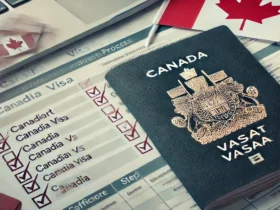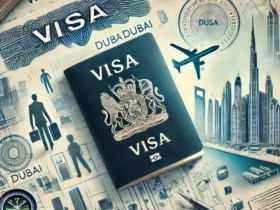Studying in Canada as a foreign student is an exciting opportunity to gain a world-class education while experiencing a rich, multicultural environment. However, before you can embark on this academic adventure, you’ll need to go through a detailed application process that includes gathering several important documents. Ensuring you have all the necessary paperwork in order can save you from delays, confusion, and potential visa issues. In this comprehensive guide, we will walk you through all the essential documents you need to successfully apply to study in Canada as an international student.
1. Valid Passport
A valid passport is the most basic document you need when considering studying abroad. Your passport should be up to date and valid for the entire duration of your stay in Canada. Ensure that it doesn’t expire within at least six months of your intended entry into the country, as this could lead to complications with both your visa application and university admissions process.
Key Considerations:
- Ensure your passport has enough blank pages for visa stamps.
- If your passport expires during your studies, you will need to renew it before applying for a study permit extension.
2. Letter of Acceptance from a Designated Learning Institution (DLI)
A letter of acceptance is a document issued by the Canadian educational institution that confirms you have been accepted to study there. The institution you plan to attend must be a Designated Learning Institution (DLI) — a school approved by the Canadian government to host international students.
Important Information on Letters of Acceptance:
- The letter will include essential details such as your program of study, the start and end date of your course, and any tuition fees or financial commitments.
- You’ll need this letter when applying for a study permit. Without it, your application will not be processed.
3. Proof of Financial Support
Canada requires all international students to demonstrate that they have enough funds to cover their tuition fees, living expenses, and return transportation. This is to ensure that you will be able to support yourself while studying without relying on external financial aid or government assistance.
Documents That Serve as Proof of Financial Support Include:
- Bank statements from the past four months.
- Proof of a student loan from a financial institution.
- A letter from a sponsor who is financially responsible for you, if applicable.
- Proof of funding from scholarships, bursaries, or grants.
- A Guaranteed Investment Certificate (GIC) from a participating Canadian financial institution.
The minimum funds required for a year of study in Canada are about CAD 10,000 for living expenses, not including tuition. If you are bringing family members, you will need additional financial proof.
4. Study Permit
A study permit is a mandatory document for foreign nationals intending to study in Canada for more than six months. It serves as a visa that allows you to live and study in the country legally. You will apply for this permit after receiving your letter of acceptance.
Application Process for a Study Permit:
- Apply online through the Immigration, Refugees and Citizenship Canada (IRCC) website.
- Provide your letter of acceptance, proof of financial support, passport, and additional documents as needed.
- Pay the application fee, which is around CAD 150.
Study permits are usually valid for the length of your study program plus an additional 90 days, giving you time to either prepare to leave Canada or apply for an extension if needed.
5. Educational Transcripts and Certificates
When applying to Canadian institutions, you will need to provide copies of your educational transcripts and certificates, which outline your academic history. These documents are essential in proving that you meet the academic qualifications required by the institution.
Key Tips for Submitting Transcripts:
- Ensure the transcripts are official copies from your previous school or university.
- Some institutions may require transcripts to be translated into English or French (the two official languages of Canada), depending on your country of origin.
- It’s a good idea to start the process of collecting these documents early, as they can take time to acquire from previous institutions.
6. Proof of English or French Language Proficiency
Since most institutions in Canada offer programs in English or French, proof of language proficiency is often a crucial requirement. The language requirement ensures that you can follow the course materials, participate in lectures, and succeed academically.
Accepted Language Tests:
- For English: International English Language Testing System (IELTS), Test of English as a Foreign Language (TOEFL), Pearson Test of English (PTE) Academic.
- For French: Test d’évaluation de français (TEF), Test de connaissance du français (TCF).
Each institution will have its own minimum score requirements, so check with your chosen school to determine which test scores are accepted and what the minimum passing marks are.
7. Statement of Purpose (SOP)
A Statement of Purpose is often required when applying for both university admissions and a Canadian study permit. This document explains why you want to study in Canada, your academic and career goals, and how the specific program will help you achieve those goals.
Key Points to Include in Your SOP:
- Your background and academic achievements.
- Reasons for choosing Canada and the particular institution.
- Future career plans and how your studies align with these plans.
- Why you will return to your home country after completing your studies (this is especially important for visa purposes).
8. Medical Examination Report
A medical exam may be required depending on your country of residence or the length of time you plan to stay in Canada. If you are required to undergo a medical exam, you will need to visit a physician approved by the Canadian government.
Steps for Medical Examination:
- The medical exam includes blood tests, X-rays, and a general health check.
- Results are sent directly to the Canadian immigration authorities by the physician.
It’s important to complete the medical exam well in advance, as it can take time for the results to be processed.
9. Custodian Declaration (For Minors)
If you are under the age of 18 or 19 (depending on the province), and you plan to study in Canada without a parent or legal guardian, you will need to provide a Custodian Declaration. This document proves that a Canadian citizen or permanent resident has agreed to act as your custodian while you study in Canada.
10. Passport-Sized Photographs
As part of your study permit and visa application, you’ll need to provide passport-sized photos that meet the Canadian visa requirements. The dimensions and quality of the photographs must adhere to specific guidelines set by Canadian authorities.
Photo Requirements:
- Photos must be clear, with a plain white background.
- They should measure 35mm x 45mm.
- Ensure your face is fully visible without any shadows or obstructions.
11. Immigration Medical Insurance
While not a mandatory requirement for your study permit, it is highly recommended to have health insurance when studying in Canada. Some provinces may offer healthcare coverage to international students, while others will require you to purchase private insurance.
Health Insurance Tips:
- Check with your institution to see if they offer student health plans.
- Ensure the insurance covers medical treatments, hospital visits, and emergency care.
12. Police Clearance Certificate
In certain cases, you may be required to submit a Police Clearance Certificate or criminal background check, especially if you are studying in a sensitive field or require a co-op work permit.
How to Obtain a Police Certificate:
- Apply for the certificate at your local police station or relevant government body.
- The certificate should indicate that you have no criminal record.
Conclusion
Preparing the required documents to study in Canada as a foreign student can feel overwhelming at first, but with careful planning and organization, the process becomes manageable. Begin gathering your documents early, double-check all the requirements for your specific situation, and keep track of deadlines to avoid delays. By ensuring that your paperwork is complete and accurate, you’ll be one step closer to realizing your dream of studying in Canada.
Whether it’s obtaining a study permit, securing proof of financial support, or presenting your letter of acceptance, every document plays a vital role in your journey. So, take your time to prepare and enjoy the path ahead as you work toward a new academic chapter in one of the world’s most renowned education systems.
By following these guidelines and ensuring all necessary documents are in order, you will be well on your way to a smooth application process and an exciting study experience in Canada!





